2012届中考英语二轮复习教材突破篇Period 13 [Unit 1,Book 8B]
文档属性
| 名称 | 2012届中考英语二轮复习教材突破篇Period 13 [Unit 1,Book 8B] | 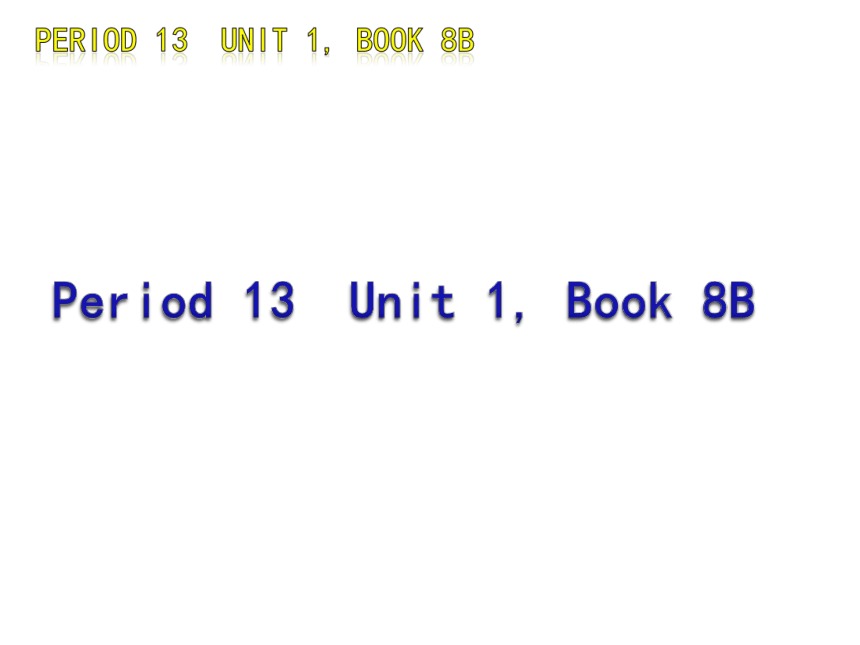 | |
| 格式 | zip | ||
| 文件大小 | 270.2KB | ||
| 资源类型 | 教案 | ||
| 版本资源 | 通用版 | ||
| 科目 | 英语 | ||
| 更新时间 | 2012-03-04 20:49:21 | ||
图片预览

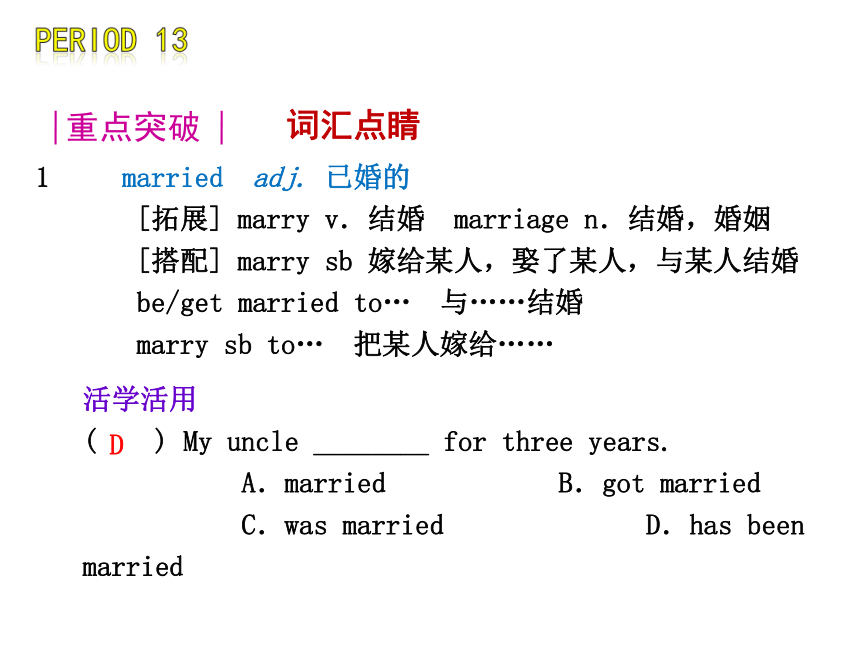
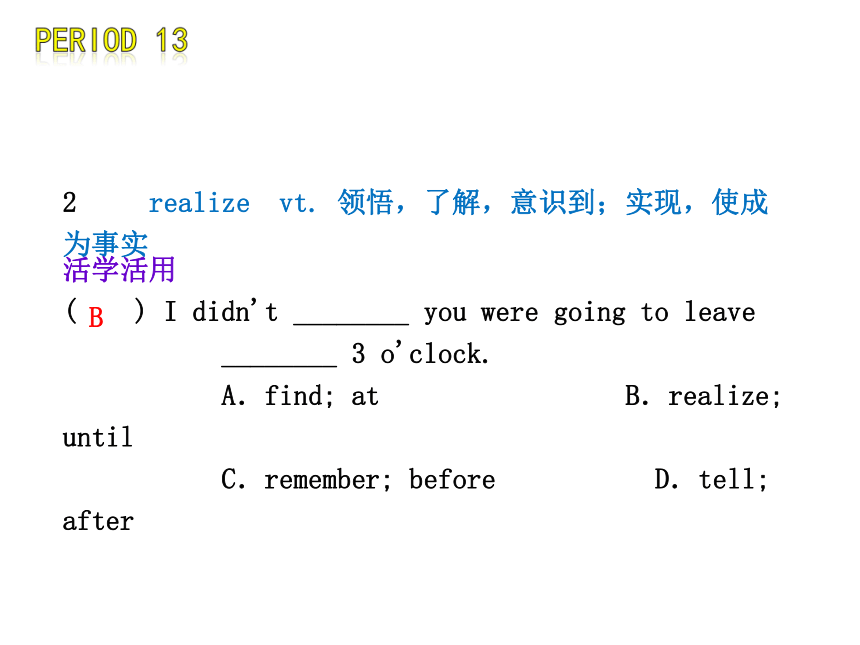
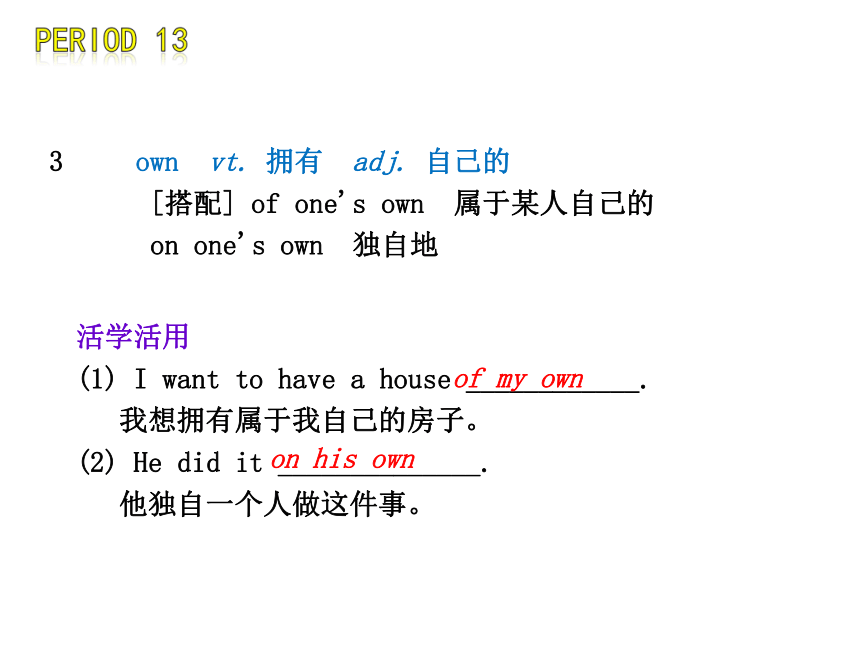
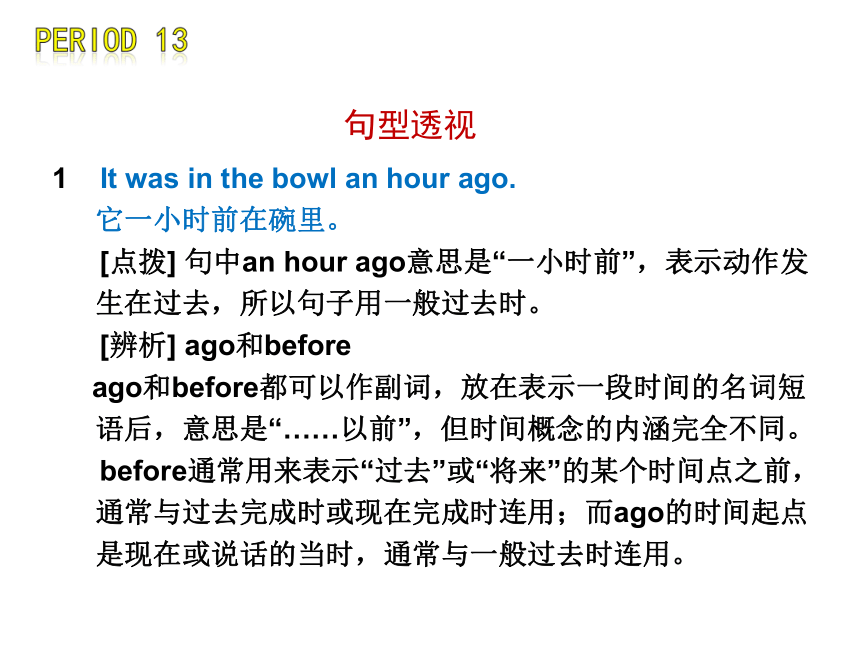
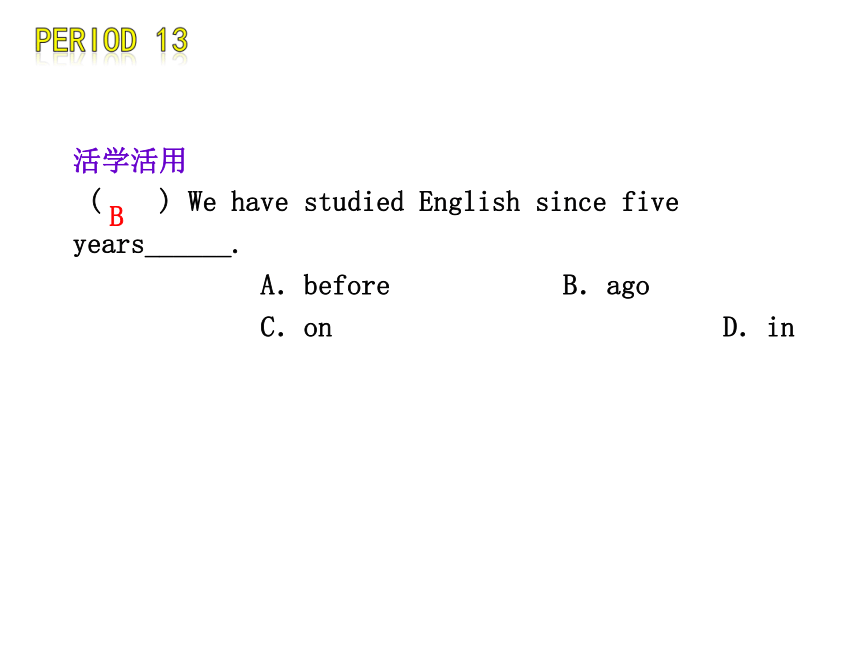
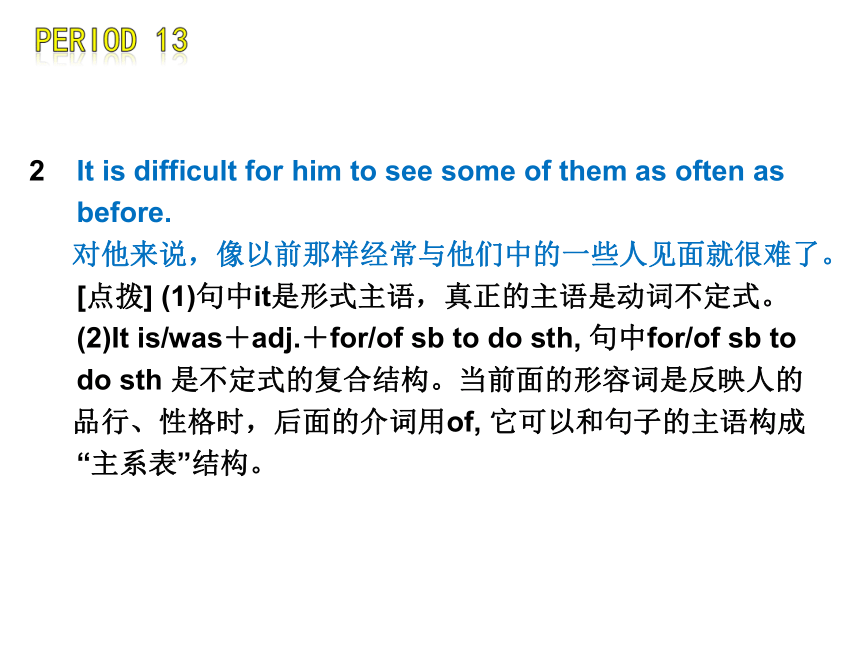
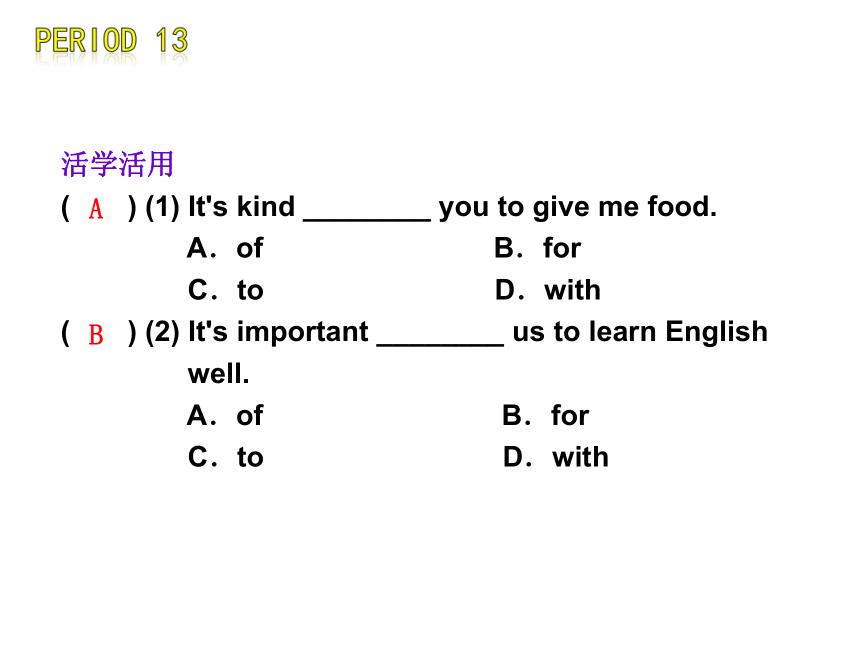
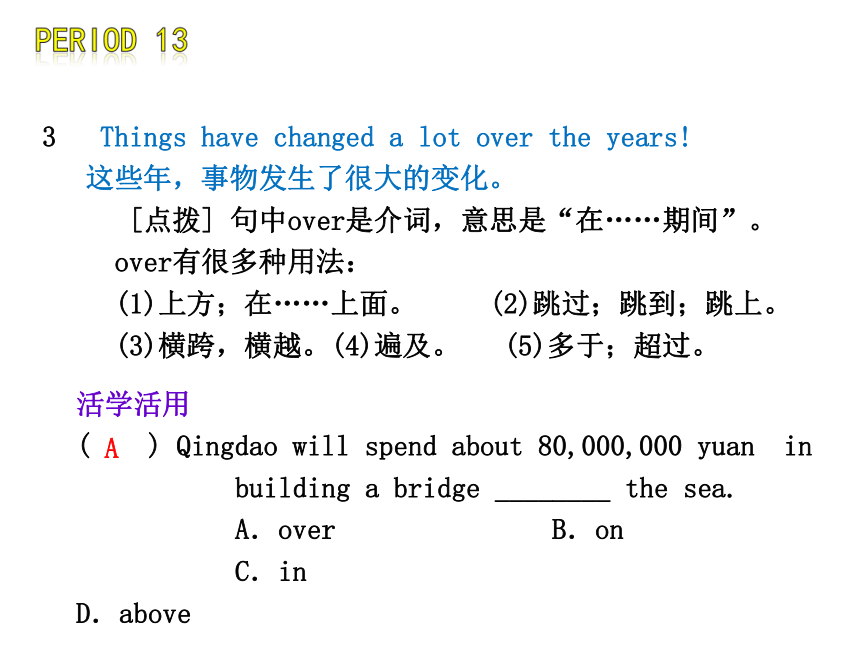
文档简介
(共20张PPT)
·译林牛津版
·译林牛津版
词汇点睛
重点突破
1 married adj. 已婚的
[拓展] marry v.结婚 marriage n.结婚,婚姻
[搭配] marry sb 嫁给某人,娶了某人,与某人结婚
be/get married to… 与……结婚
marry sb to… 把某人嫁给……
活学活用
( ) My uncle ________ for three years.
A.married B.got married
C.was married D.has been married
D
·译林牛津版
2 realize vt. 领悟,了解,意识到;实现,使成为事实
活学活用
( ) I didn't ________ you were going to leave
________ 3 o'clock.
A.find; at B.realize; until
C.remember; before D.tell; after
B
·译林牛津版
3 own vt. 拥有 adj. 自己的
[搭配] of one's own 属于某人自己的
on one's own 独自地
活学活用
(1) I want to have a house ____________.
我想拥有属于我自己的房子。
(2) He did it ______________.
他独自一个人做这件事。
of my own
on his own
·译林牛津版
句型透视
1 It was in the bowl an hour ago.
它一小时前在碗里。
[点拨] 句中an hour ago意思是“一小时前”,表示动作发
生在过去,所以句子用一般过去时。
[辨析] ago和before
ago和before都可以作副词,放在表示一段时间的名词短
语后,意思是“……以前”,但时间概念的内涵完全不同。
before通常用来表示“过去”或“将来”的某个时间点之前,
通常与过去完成时或现在完成时连用;而ago的时间起点
是现在或说话的当时,通常与一般过去时连用。
·译林牛津版
活学活用
( ) We have studied English since five years______.
A.before B.ago
C.on D.in
B
·译林牛津版
2 It is difficult for him to see some of them as often as
before.
对他来说,像以前那样经常与他们中的一些人见面就很难了。
[点拨] (1)句中it是形式主语,真正的主语是动词不定式。
(2)It is/was+adj.+for/of sb to do sth, 句中for/of sb to
do sth 是不定式的复合结构。当前面的形容词是反映人的
品行、性格时,后面的介词用of, 它可以和句子的主语构成
“主系表”结构。
·译林牛津版
活学活用
( ) (1) It's kind ________ you to give me food.
A.of B.for
C.to D.with
( ) (2) It's important ________ us to learn English
well.
A.of B.for
C.to D.with
A
B
·译林牛津版
3 Things have changed a lot over the years!
这些年,事物发生了很大的变化。
[点拨] 句中over是介词,意思是“在……期间”。
over有很多种用法:
(1)上方;在……上面。 (2)跳过;跳到;跳上。
(3)横跨,横越。(4)遍及。 (5)多于;超过。
活学活用
( ) Qingdao will spend about 80,000,000 yuan in
building a bridge ________ the sea.
A.over B.on
C.in D.above
A
·译林牛津版
4 The pollution was terrible then because the factory
used to dump its waste into the river.
那时污染太可怕了,因为那个工厂过去常常把它的废料
倒入河中。
[辨析] used to do sth, be(get) used to sth/doing sth,
be used to do, be used for和be used as
(1)used to do sth“过去常常做某事”,暗含现在不再这
样做了,其中的to为不定式符号。
(2)be(get) used to sth/ doing sth“习惯于做某事”,其
中to为介词。
·译林牛津版
(3)be used to do是use sth to do sth 结构的被动式,意为“被用来做……”。
(4)be used for…被用来……
(5)be used as…被用作……
活学活用
( ) —Nancy You have straight hair!
—Yeah, it ________ be curly hair.
A.wanted to B.loved to
C.used to D.helped to
C
基础过关
·译林牛津版
词汇专练
Ⅰ. 根据句意及首字母提示完成单词
1.Chinese government r________ some things must
be done to protect the environment.
2. Many children love playing computer games at
p_______.
3.Was water p________ really a serious problem in
the town in the past
ealized
resent
ollution
·译林牛津版
4.The boy has o______ this kind of model plane
for half a year.
5. We lived together until 1990 when I got m_______.
6.The new railway station has been in s_______ for
three months.
wned
arried
ervice
·译林牛津版
Ⅱ. 根据汉语提示完成句子
1.The place is too ________ (吵), we can't live here.
2.There are many new __________ (工厂) in this area.
3.Have you had an __________ (采访) with the stars
4.He lost his English book. How __________ (倒霉的)
he is!
5.It's nice to have ________ (开阔的) space and pretty
gardens.
noisy
factories
interview
unlucky
wide
·译林牛津版
Ⅲ. 用所给词的适当形式填空
1.I have ________ (know) him for two years.
2. Eating too much will make you __________ (health).
3.They landed ________ (safe) yesterday.
4.She's __________ (please) with my work.
5.He left the room very ________ (quiet).
6.Who got the ________ (nine) place in the race
7.I met Tom in the street, I stopped ________ (talk)
with him.
I don't like the _____________ (pleasant) trip there
because of too many people.
known
unhealthy
safely
pleased
quietly
ninth
to talk
unpleasant
·译林牛津版
Ⅰ. 根据汉语意思完成句子
1.自从1925年以来,人们便开始乘飞机长途旅行了。
People have begun to have long travels _________
since 1925.
2.他从未读过这个故事。
He has _____________ this story.
3.你认识Sandy好长一段时间了吧?
Have you ________ Sandy _____ a long time
4.别扔掉我的那些旧书,它们对我来说很宝贵。
Don't ________________________,they are so dear
for me.
句型专练
by plane
never read
known
for
throw away my old books
·译林牛津版
5.我了解到这个地方发生了很大变化。
I learned that there have been __________________
this place.
6. 过去,阳光城非常自然漂亮。
Sunshine Town ______ very ________ and
___________ in the past.
7. 在我家附近曾有一家医院。
There _____________________ near my home.
8. 对他来说,像以前那样经常与他们中的有些人见面就难了。
It is difficult for him to see some of them ________
__________.
great changes in
was
natural
beautiful
used to be a hospital
as often
as before
·译林牛津版
Ⅱ. 句型转换
I've known him since_he_was_10_years_old.(对画线
部分提问)
_______ _______ _______ you known him
2.His grandpa died two years ago. (改为同义句)
His grandpa _____ ______ _______ for two years.
How
long
have
has
been
dead
·译林牛津版
3.I think the place has changed a lot. (改为否定句)
I _______ think the place ______ changed a lot.
4.Mr White taught in our school last year.(用since last
year替换last year)
Mr White ______ _________ in our school since last
year.
don't
has
has
taught
·译林牛津版
be used to doing sth.与be used to do sth.
be used to doing sth.表示“习惯于做某事”,其中to是
介词,后接名词或动名词;be used to还可用get used
to表示“渐渐习惯于……”。如:
Is she used to walking after supper
她习惯晚饭后散步吗?
(2) be used to do sth.表示“被用来做某事”。如:
This computer is used to control all the machines.
这台电脑是用来控制所有机器的。
每日一辨
·译林牛津版
·译林牛津版
词汇点睛
重点突破
1 married adj. 已婚的
[拓展] marry v.结婚 marriage n.结婚,婚姻
[搭配] marry sb 嫁给某人,娶了某人,与某人结婚
be/get married to… 与……结婚
marry sb to… 把某人嫁给……
活学活用
( ) My uncle ________ for three years.
A.married B.got married
C.was married D.has been married
D
·译林牛津版
2 realize vt. 领悟,了解,意识到;实现,使成为事实
活学活用
( ) I didn't ________ you were going to leave
________ 3 o'clock.
A.find; at B.realize; until
C.remember; before D.tell; after
B
·译林牛津版
3 own vt. 拥有 adj. 自己的
[搭配] of one's own 属于某人自己的
on one's own 独自地
活学活用
(1) I want to have a house ____________.
我想拥有属于我自己的房子。
(2) He did it ______________.
他独自一个人做这件事。
of my own
on his own
·译林牛津版
句型透视
1 It was in the bowl an hour ago.
它一小时前在碗里。
[点拨] 句中an hour ago意思是“一小时前”,表示动作发
生在过去,所以句子用一般过去时。
[辨析] ago和before
ago和before都可以作副词,放在表示一段时间的名词短
语后,意思是“……以前”,但时间概念的内涵完全不同。
before通常用来表示“过去”或“将来”的某个时间点之前,
通常与过去完成时或现在完成时连用;而ago的时间起点
是现在或说话的当时,通常与一般过去时连用。
·译林牛津版
活学活用
( ) We have studied English since five years______.
A.before B.ago
C.on D.in
B
·译林牛津版
2 It is difficult for him to see some of them as often as
before.
对他来说,像以前那样经常与他们中的一些人见面就很难了。
[点拨] (1)句中it是形式主语,真正的主语是动词不定式。
(2)It is/was+adj.+for/of sb to do sth, 句中for/of sb to
do sth 是不定式的复合结构。当前面的形容词是反映人的
品行、性格时,后面的介词用of, 它可以和句子的主语构成
“主系表”结构。
·译林牛津版
活学活用
( ) (1) It's kind ________ you to give me food.
A.of B.for
C.to D.with
( ) (2) It's important ________ us to learn English
well.
A.of B.for
C.to D.with
A
B
·译林牛津版
3 Things have changed a lot over the years!
这些年,事物发生了很大的变化。
[点拨] 句中over是介词,意思是“在……期间”。
over有很多种用法:
(1)上方;在……上面。 (2)跳过;跳到;跳上。
(3)横跨,横越。(4)遍及。 (5)多于;超过。
活学活用
( ) Qingdao will spend about 80,000,000 yuan in
building a bridge ________ the sea.
A.over B.on
C.in D.above
A
·译林牛津版
4 The pollution was terrible then because the factory
used to dump its waste into the river.
那时污染太可怕了,因为那个工厂过去常常把它的废料
倒入河中。
[辨析] used to do sth, be(get) used to sth/doing sth,
be used to do, be used for和be used as
(1)used to do sth“过去常常做某事”,暗含现在不再这
样做了,其中的to为不定式符号。
(2)be(get) used to sth/ doing sth“习惯于做某事”,其
中to为介词。
·译林牛津版
(3)be used to do是use sth to do sth 结构的被动式,意为“被用来做……”。
(4)be used for…被用来……
(5)be used as…被用作……
活学活用
( ) —Nancy You have straight hair!
—Yeah, it ________ be curly hair.
A.wanted to B.loved to
C.used to D.helped to
C
基础过关
·译林牛津版
词汇专练
Ⅰ. 根据句意及首字母提示完成单词
1.Chinese government r________ some things must
be done to protect the environment.
2. Many children love playing computer games at
p_______.
3.Was water p________ really a serious problem in
the town in the past
ealized
resent
ollution
·译林牛津版
4.The boy has o______ this kind of model plane
for half a year.
5. We lived together until 1990 when I got m_______.
6.The new railway station has been in s_______ for
three months.
wned
arried
ervice
·译林牛津版
Ⅱ. 根据汉语提示完成句子
1.The place is too ________ (吵), we can't live here.
2.There are many new __________ (工厂) in this area.
3.Have you had an __________ (采访) with the stars
4.He lost his English book. How __________ (倒霉的)
he is!
5.It's nice to have ________ (开阔的) space and pretty
gardens.
noisy
factories
interview
unlucky
wide
·译林牛津版
Ⅲ. 用所给词的适当形式填空
1.I have ________ (know) him for two years.
2. Eating too much will make you __________ (health).
3.They landed ________ (safe) yesterday.
4.She's __________ (please) with my work.
5.He left the room very ________ (quiet).
6.Who got the ________ (nine) place in the race
7.I met Tom in the street, I stopped ________ (talk)
with him.
I don't like the _____________ (pleasant) trip there
because of too many people.
known
unhealthy
safely
pleased
quietly
ninth
to talk
unpleasant
·译林牛津版
Ⅰ. 根据汉语意思完成句子
1.自从1925年以来,人们便开始乘飞机长途旅行了。
People have begun to have long travels _________
since 1925.
2.他从未读过这个故事。
He has _____________ this story.
3.你认识Sandy好长一段时间了吧?
Have you ________ Sandy _____ a long time
4.别扔掉我的那些旧书,它们对我来说很宝贵。
Don't ________________________,they are so dear
for me.
句型专练
by plane
never read
known
for
throw away my old books
·译林牛津版
5.我了解到这个地方发生了很大变化。
I learned that there have been __________________
this place.
6. 过去,阳光城非常自然漂亮。
Sunshine Town ______ very ________ and
___________ in the past.
7. 在我家附近曾有一家医院。
There _____________________ near my home.
8. 对他来说,像以前那样经常与他们中的有些人见面就难了。
It is difficult for him to see some of them ________
__________.
great changes in
was
natural
beautiful
used to be a hospital
as often
as before
·译林牛津版
Ⅱ. 句型转换
I've known him since_he_was_10_years_old.(对画线
部分提问)
_______ _______ _______ you known him
2.His grandpa died two years ago. (改为同义句)
His grandpa _____ ______ _______ for two years.
How
long
have
has
been
dead
·译林牛津版
3.I think the place has changed a lot. (改为否定句)
I _______ think the place ______ changed a lot.
4.Mr White taught in our school last year.(用since last
year替换last year)
Mr White ______ _________ in our school since last
year.
don't
has
has
taught
·译林牛津版
be used to doing sth.与be used to do sth.
be used to doing sth.表示“习惯于做某事”,其中to是
介词,后接名词或动名词;be used to还可用get used
to表示“渐渐习惯于……”。如:
Is she used to walking after supper
她习惯晚饭后散步吗?
(2) be used to do sth.表示“被用来做某事”。如:
This computer is used to control all the machines.
这台电脑是用来控制所有机器的。
每日一辨
